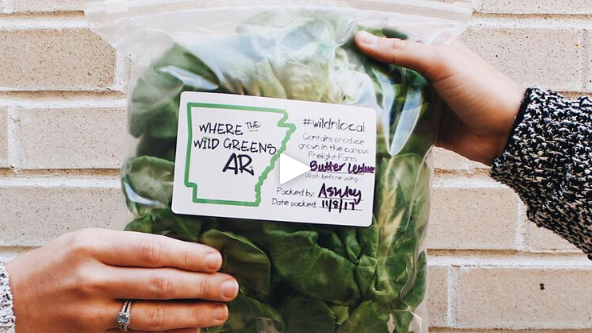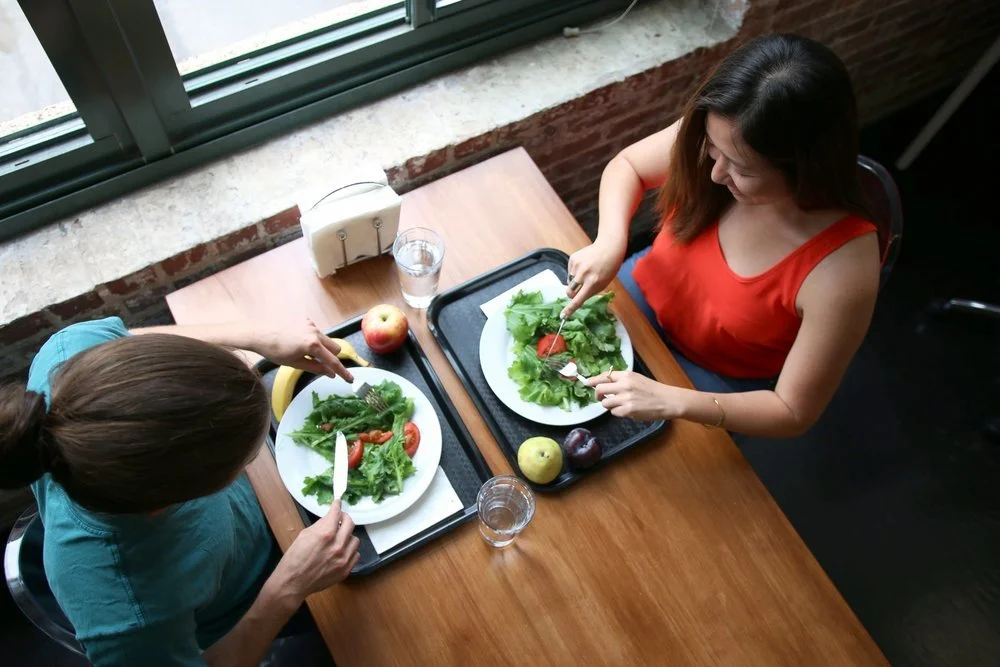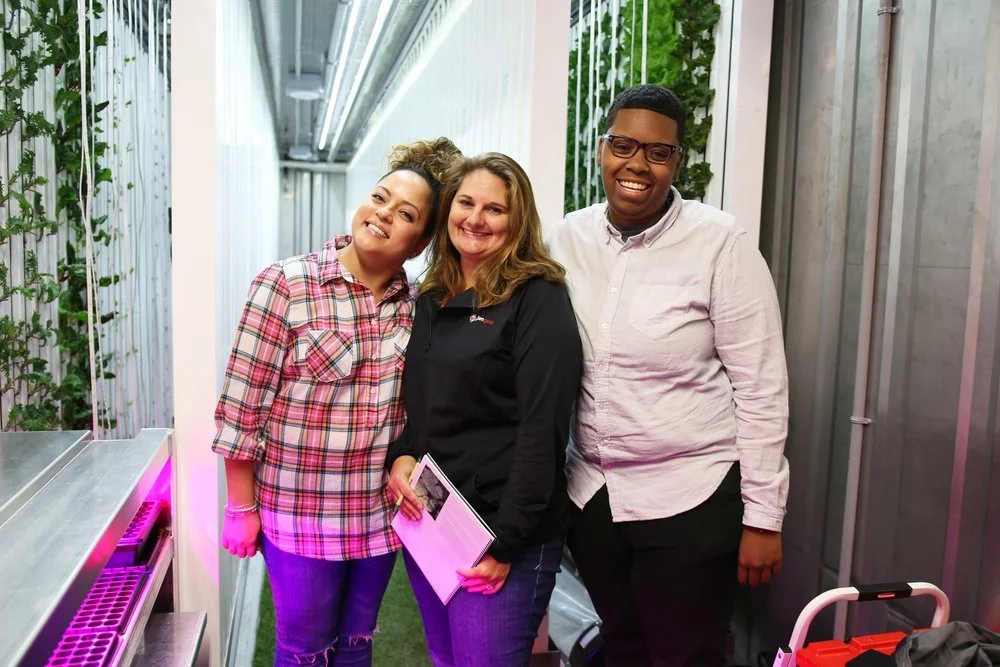10 Reasons Every School Needs A Farm On Campus
Transform your Campus with a Greenery™ S!
Engage campus communities, create learning opportunities, start conversations about innovation and sustainability, and cultivate vibrant produce.
At Freight Farms, we work with campuses to integrate hydroponic produce into dining services and school curricula. Read on as we explore the ways a Greenery S can transform your campus culture and identity.
1. Provide students of many backgrounds with hands-on experience
The Greenery S is a great teaching tool. Students with various career and extra-curricular interests can find value in operating the container farm.
Agriculture and Biology
Students can learn about the process of growing with hydroponic technology and work to optimize yields and grow new crops through data analysis and experimentation.
Engineering and Industrial Design
Students can study the design and mechanics that make vertical, commercial-grade agriculture possible in such a small space.
Computer Science
The Greenery S’s automation and remote control systems are real-world IoT applications, with constant data communication between the farmhand® app, the farm's onboard computer, and internal growing components.
Business and Marketing
Whether you are operating the Greenery S for a profit or not, business and marketing students can get real life experience creating business plans, marketing collateral, and financial analyses.
Statistics
The Greenery S generates a lot of data, all of which is essential in optimizing farm production. Students can work with farm operators to analyze the data collected in the farmhand® app and suggest improvements.
Sustainability
The Greenery S is a great example of sustainability, and can act as a case study for sustainable design, agriculture, and business.
These are just a few of many great reasons to bring a Greenery S to your campus this year! The Freight Farms team can work with administrators, alumni, faculty, and students to figure out the best way to provide a university with fresh food from their very own vertical hydroponic farm. Click here to learn more!
See how a Leafy Green Machine (one of our previous models of a container farm) helped transform the University of Arkansas campus.
See how a Leafy Green Machine ™ (one of our previous models of a container farm) helped transform the University of Arkansas campus.
2. Serve the freshest food year-round
One of the primary benefits of container farming is its season-agnostic growing capabilities. By growing warm-weather lettuces, leafy greens, and herbs on campus year-round, you can provide your students and faculty with the freshest food available. Not only do dining hall chefs love the produce that comes out of the Greenery S, but students also appreciate a salad bar stocked with tasty and crunchy vegetables.
On harvest days, I deliver the lettuce around 10:30, lunch service starts at 11, so students are getting produce that was harvested just a half an hour ago.
Nick Pagan, Clark University
3. Attract a new generation of students
In 2021, Generation Z-ers (born 1999-present) fill our schools. More than the generations before it, Generation Z cares deeply about making the world a better place. This influences their brand loyalty, purchase decisions, job choices...and also their college decisions. 75% of students say that having information about a college's commitment to environmental issues would contribute to their application and/or attendance decisions.
4. Create transparency in your campus food system
Local hydroponic farming provides transparency into an otherwise obscure food system. Today, most food service providers source the majority of their fresh produce from huge farms in California, Central America, or South America. Our produce can travel thousands of miles, and consumers have little awareness of who is growing it. Having an on-campus container farm creates a transparent option for sourcing food and, by reducing the distance food travels, consumers can better understand the means of production. Integrating a container farm into your campus will increase awareness and make students and faculty feel more involved with the food they eat in the dining halls.
5. Educate about the food supply chain
Once students and faculty are engaged in your on-campus hydroponic farm, you can begin teaching them about the traditional food system and the benefits of a short food supply chain. The Greenery S is a great educational platform, as it engages and inspires the student body to value transparency and seek information about their food’s origin. With the right knowledge, students can make educated decisions that support their activities as consumers in the broader food system.
Educational ideas that have worked for our university clients:
Farm tours for current students, prospective students, alumni, and/or faculty
Breakout sessions about the food system and different growth methods (industrial, organic, hydroponic, aeroponic)
Dining services sessions on cooking with fresh produce
6. Promote health, wellness, and nutrition
Needless to say, encouraging the consumption of fresh vegetables is a great way to promote campus wellness. The Greenery S is able to elevate the salad bar — boosting it from “blah” to one of your campus' most unique features. Here are just three ways to get the student body excited about their greens:
Pique curiosity and promote healthy eating with exotic crops like tatsoi, mizuna, and radicchio. See all of the produce you can grow in our crop guide!
Place signage around the dining hall to explain where and how your hydroponic produce is being grown.
Create learning opportunities around your crops with nutrition seminars to teach students how the Greenery S’s produce fits into a healthy and holistic lifestyle.
7. Demonstrate your commitment to sustainability
As college admissions resources like the Princeton Review increasingly give attention to “green” campuses, a school’s commitment to sustainable initiatives is more important than ever. Having a container farm on campus is one way to put your money where your mouth is: By investing in a Greenery S, your school can prove an undeniable commitment to sustainability.
How does our container farm promote sustainability? The Greenery S immediately shortens the food supply chain, cuts fuel emissions, and decreases the transportation costs of your campus’ food operation. The container’s insulation also eliminates the need for herbicides or pesticides, while the closed-loop hydroponic system uses 99% less water than conventional farming methods.
8. Be an advocate for innovative technology and inspire future leaders
With a Greenery S, current and prospective students will see your commitment to promoting and exploring new and disruptive technologies. Not only will the farm make students think critically about their food, but it can also inspire them to pursue sustainable solutions in their own fields.
9. Modernize without expensive construction
With the discussion turning to sustainability and green design, many universities face a difficult situation: How do you upgrade without rebuilding? While green design typically saves money in the long run, administrators are often hesitant about the up-front costs of construction on campus. The Greenery S is an easy way to modernize your campus and meet sustainability goals without breaking ground.
10. Get the whole campus involved!
The opportunities for engaging your campus community with your new container farm are endless! Tours, talks, cooking demonstrations, harvest parties, CSA programs, course integrations, and all-around delicious greens are a sure way to rally your community behind sustainability and wellness — one school even opened a restaurant exclusively to serve their hydroponic produce! Check out our 2020 Farm-to-School Month virtual events for inspiration and more ideas on community engagement.
Interested in bringing a farm to your campus?
Download our comprehensive Farm to School guide to see how the Greenery™ S can transform your campus.




